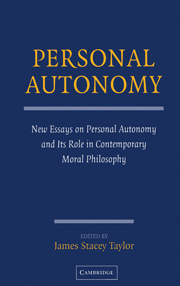Introduction
Published online by Cambridge University Press: 03 December 2009
Summary
In recent years, the concept of autonomy has become ubiquitous in moral philosophy. Discussions of the nature of autonomy, its value, and how one should respect it are now common place in philosophical debates, ranging from the metaphysics of moral responsibility to the varied concerns of applied philosophy. All of these debates are underpinned by an increasingly flourishing and sophisticated literature that addresses the fundamental question of the nature of personal autonomy.
The concept of autonomy has, of course, been important for moral philosophy for some time, being central to the ethical theories of both Immanuel Kant and such contemporary Kantians as Thomas Hill and Christine Korsgaard. However, recent interest in personal autonomy does not focus on the Kantian conception of autonomy on which a person is autonomous if her will is entirely devoid of all personal interests. Instead, it focuses on a more individualistic conception of this notion, whereby a person is autonomous with respect to her desires, actions, or character to the extent that they originate in some way from her motivational set, broadly construed.
Interest in this individualistic conception of autonomy was stimulated by the publication of a series of papers in the early 1970s, in which Harry Frankfurt, Gerald Dworkin, and Wright Neely independently developed “hierarchical” accounts of personal autonomy. The shared core of these accounts is both simple and elegant: A person is autonomous with respect to a first-order desire that moves her to act (e.g., she wants to smoke, and so she smokes) if she endorses her possession of that first-order desire (e.g., she wants to want to smoke).
- Type
- Chapter
- Information
- Personal AutonomyNew Essays on Personal Autonomy and its Role in Contemporary Moral Philosophy, pp. 1 - 30Publisher: Cambridge University PressPrint publication year: 2005
- 9
- Cited by



